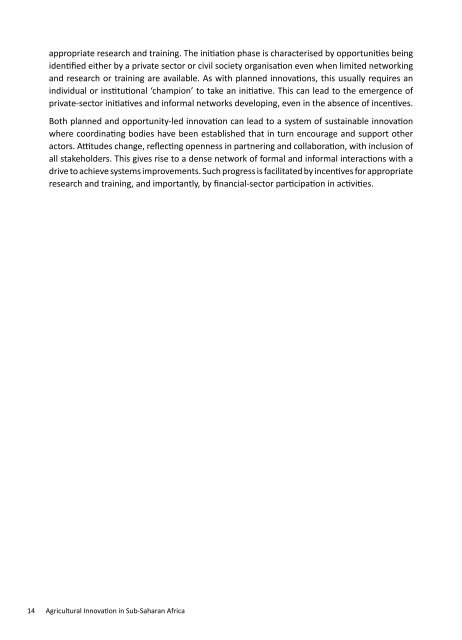- Page 1 and 2: Agricultural Innovation in Sub-Saha
- Page 3 and 4: Agricultural Innovation in Sub-Saha
- Page 5 and 6: Contents Acknowledgements 1 Forewor
- Page 7 and 8: Acknowledgements This review examin
- Page 9 and 10: Foreword Sub-Saharan Africa (SSA) f
- Page 11 and 12: • Traditional sectors including s
- Page 13 and 14: • An IP comprised of partner orga
- Page 15 and 16: Innovation approaches and intervent
- Page 17 and 18: Figure 1: A typical agricultural co
- Page 19: Table 2: Elements and characteristi
- Page 23 and 24: Figure 2: Conceptual framework for
- Page 25 and 26: Table 3: Innovation case study char
- Page 27 and 28: THE CASE STUDIES Eastern Africa Sou
- Page 29 and 30: Interventions and the roles of diff
- Page 31 and 32: including policy, production, marke
- Page 33 and 34: Achievements. The evolution of the
- Page 35 and 36: value chain from producers through
- Page 37 and 38: • Transport is handled by private
- Page 39 and 40: major consumers of export vegetable
- Page 41 and 42: • Policy: A National Horticulture
- Page 43 and 44: Lessons that militate against scali
- Page 45 and 46: Activities contributing to the late
- Page 47 and 48: When a new Government took over in
- Page 49 and 50: mini dairies in the country selling
- Page 51 and 52: (BCPA), an association representing
- Page 53 and 54: smallholder farmers in the Shire Va
- Page 55 and 56: Malawi, overcoming market challenge
- Page 57 and 58: Box 4: NASFAM structure The Nationa
- Page 59 and 60: Malawi, Increasing the availability
- Page 61 and 62: pre-breeders seed to be released by
- Page 63 and 64: commitments. The high price of inpu
- Page 65 and 66: and improving NRM. As such, the IP
- Page 67 and 68: large-scale farmers but also for sm
- Page 69 and 70: West Africa Cameroon, production an
- Page 71 and 72:
indirectly involved in the industry
- Page 73 and 74:
household incomes have risen by an
- Page 75 and 76:
Other key interventions provided by
- Page 77 and 78:
Initial challenges. The key challen
- Page 79 and 80:
environment and incentives for prod
- Page 81 and 82:
Lessons learned. Successful innovat
- Page 83 and 84:
(Nigeria First, 2005). PICPE brough
- Page 85 and 86:
human foods, future expansion will
- Page 87 and 88:
Activities have included: analysis
- Page 89 and 90:
poor road access, lack of power and
- Page 91 and 92:
Institutions Markets Support servic
- Page 93 and 94:
Table 5: Coordinating roles at the
- Page 95 and 96:
mite and the viruses that cause cas
- Page 97 and 98:
Figure 6: Private sector roles Priv
- Page 99 and 100:
With regards to research, there is
- Page 101 and 102:
Figure 8: Consequences of stakehold
- Page 103 and 104:
Before Innovation After innovation
- Page 105 and 106:
cooperation, builds trust, and esta
- Page 107 and 108:
laboratories as well as effective b
- Page 109 and 110:
Improving access to information, kn
- Page 111 and 112:
Annexes Regions, authors and case s
- Page 113 and 114:
Kenya’s dairy sector Organisation
- Page 115 and 116:
Kenya’s horticulture with special
- Page 117 and 118:
Uganda’s dairy industry Organisat
- Page 119 and 120:
Malawi, building public-private par
- Page 121 and 122:
Malawi, increasing the availability
- Page 123 and 124:
Zambia’s conservation agriculture
- Page 125 and 126:
Cameroon’s garlic industry Organi
- Page 127 and 128:
Ghana’s growing cassava sector Or
- Page 129 and 130:
Nigeria’s cassava production and
- Page 131 and 132:
Annex 2: The role of the public sec
- Page 133 and 134:
Policy and regulatory framework Uga
- Page 135 and 136:
Policy and regulatory framework Inf
- Page 137 and 138:
Ghana’s growing cassava sector Pr
- Page 139 and 140:
Main types of interaction Consequen
- Page 141 and 142:
Southern Africa Main types of inter
- Page 143 and 144:
West Africa Main types of interacti
- Page 145 and 146:
Main types of interaction Consequen
- Page 147 and 148:
FAOSTAT. (2010) Food and Agricultur
- Page 149 and 150:
Century and Beyond. Republic of Ken
- Page 151 and 152:
Acronyms and abbreviations AAK ABU
- Page 153 and 154:
EARO EC ECABREN ECGPEA ECX EAPGREN
- Page 155 and 156:
LGA MAAIF MAHUDE MAL MBS M&E MARD M
- Page 157:
SHEPUP SHoMAP SIDA SOFECSA SPDC SPE
- Page 160:
Forum for Agricultural Research in


